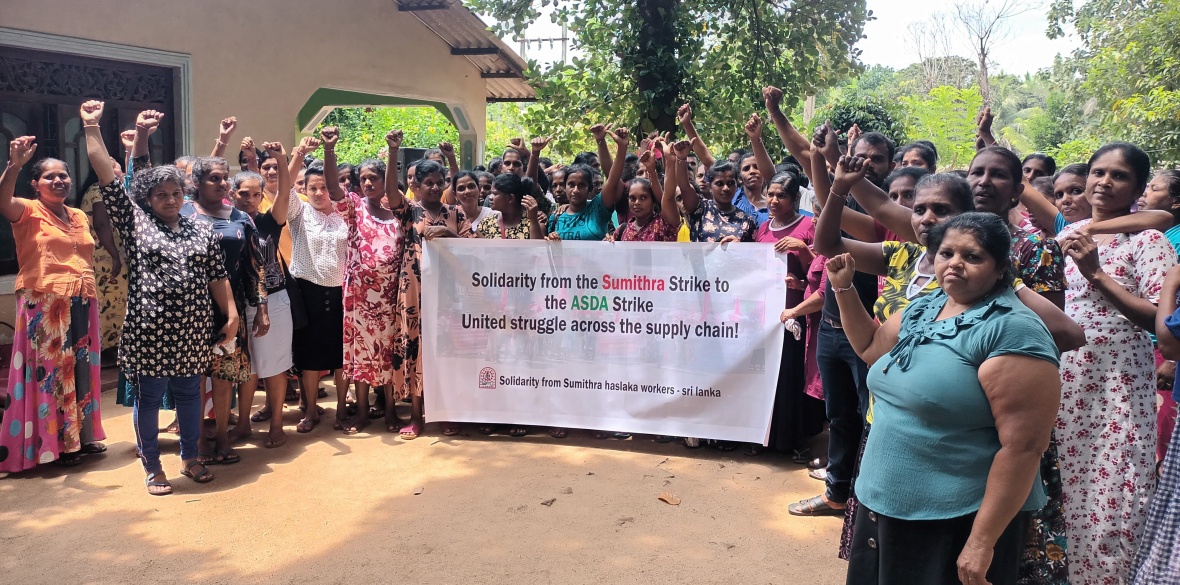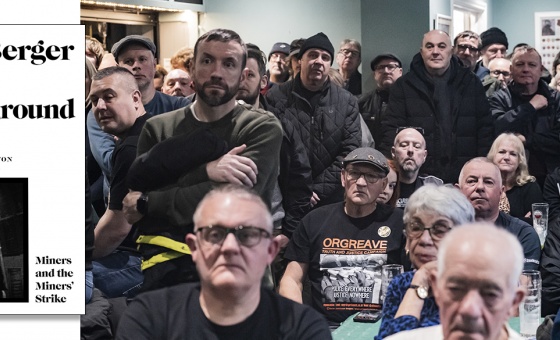This is the last article you can read this month
You can read more article this month
You can read more articles this month
Sorry your limit is up for this month
Reset on:
Please help support the Morning Star by subscribing here
ON the 75th day of their strike, young women garment workers in Sri Lanka held a banner emblazoned, “Solidarity from the Sumithra strike to the Asda strike! United struggle across the Asda supply chain!”
In their video message, one woman addresses Asda retail workers going on strike over 5,000 miles away in England, in the shops where the clothes they make are sold. Smiling, she says, “You are not alone.”
Having braved months of their local bosses’ strikebreaking tactics, they sought to strengthen their fellow workers’ courage against their global bosses. In a heartfelt response, GMB national officer Nadine Houghton responded: “GMB’s Asda members fully support your struggle, and we will offer whatever solidarity we can.”
These two strikes at either end of Asda’s supply chain are historic: workers have organised and held their ground against intimidation from bosses while supporting each other across the globe — teaching us an essential lesson about the power of global solidarity.
On February 10 2024, 121 workers at the Sumithra Hasalaka factory in central Sri Lanka began a 75-day continuous strike with the Free Trade Zones and General Services Employees Union (FTZ Union), demanding a long-promised wage increase.
Workers at Sumithra are paid an average wage below £3 per day — a poverty wage. Just one kilogram of rice would eat up nearly a quarter of this. Many of the workers are the primary breadwinners for their families, so these wages condemn whole families to hunger and malnutrition.
Three of Sumithra’s factories produce garments for global corporations, including Asda, Marks and Spencer, Superdry, Dillard’s and Tom Tailor. During the strike, workers who crossed the picket line created clothes for Asda, securing profits to match the £1 billion it made last year. Asda is co-owned by private equity firm TDR Capital and the billionaire Issa brothers, who in 2023 had to rebut claims of price-gouging during Britain’s inflation crisis.
At 75 days, this highly organised strike at Sumithra is one of the longest in the history of the Sri Lankan garment sector. The Asda strike is similarly significant, as the first British strike among Asda shop workers.
Asda workers, mostly women as in Sumithra, are walking out in Hampshire, Cambridgeshire, Suffolk, London and Brighton. Alongside Asda strikers’ grievances over cuts in hours and severe health and safety concerns, they are calling out management bullying and a “toxic” work environment.
In Asda and other British supermarkets, workers are being replaced by machines, through self-checkouts and a huge shift to online operations. The dwindling number of staff who remain are subject to work intensification — with changes to contracts meaning that staff have premium rates cut for unsocial hours, fewer breaks and more responsibilities.
While there is more legal protection for workers in Britain than in Sri Lanka, as an increasingly casualised workforce, retail workers are relatively exposed. The “toxic” culture is being increasingly shaped by the interests of Asda’s private equity firms’ owners.
On the other side of the supply chain, in Sri Lanka’s garment industry, bullying is endemic. In Sri Lanka, factory bosses extract profit from garment workers not by replacing workers with machines, but only by intensifying work: sweating out the greatest possible amount of work in every unit of time through extreme control.
The Sumithra strike was sparked when management locked workers in the factory and assaulted union members to block a union meeting on the wage offer. The intimidation only ramped up from there: bosses increased work hours to prevent strikers from speaking to other workers and filed baseless police reports. Since the strike ended under compulsory arbitration, the FTZ Union reported severe retaliation against strikers, including harassment and public shaming.
Workers across the Sri Lankan garment industry have faced waves of disaster over the past five years. These were man-made — or rather, capital-made — from Covid wage thefts, exposure to mass infections and lay-offs, to uninhabitable “boarding houses” during the 2021 floods, and the economic meltdown of 2022.
Inflation ravaged markets in Sri Lanka in 2022 and 2023, peaking at a record 85 per cent for food in September 2022, but still as high as 49 per cent the following February.
Trade union agitation, supported by organisations like War on Want, the Clean Clothes Campaign and Labour Behind the Label, won crisis relief allowances at certain factories for 2022. While most employers paid only half the union demand, Sumithra offered even less. Workers received no increase in 2023, and the “substantial” offer promised for 2024 was a pittance: only an additional £0.17 per day.
It is no accident that the precarious, highly exploited women workers at both ends of Asda’s supply chain face poverty wages, increasing workloads and routine intimidation. Not only is the system designed to profit global North investors at the expense of the global working class; but it also requires work to be organised in particular ways at different locations in the supply chain. The history of colonialism shapes the most brutal points.
In Sri Lanka we can trace the current situation back to 1977 and the beginning of the neoliberal “open” economic order. The relative gains of the struggling masses in the post-colonial period were dismantled, and there was an escalation of ethnonationalist and repressive state terror.
Sri Lanka’s “export-oriented industrialisation” model reinserted the island into its colonial place in the global economy as a source of low-value (for the producing country), labour-intensive products, heavily dependent on foreign capital. Only this time, the plantation economy and land grabs were joined by the mushrooming of garment factories.
The 1982 Polytex strike that launched the garment workers’ struggle in Sri Lanka came just two years after the violent repression of the 1980 general strike. Young women from rural areas, imagined by bosses to be docile, have battled through fear for four decades now.
The Sumithra strikers built courage through their relationships, in monsoon rains and 40-degree heat. On Valentine’s Day, they all wore red for each other. While management counted on them returning to work in desperation to collect their Sri Lankan New Year bonus in mid-April, they voted to stay out and held an enormous union festival.
When news of the Asda strikes in Britain reached the Sri Lankan workers, they extended their friendship across the seas, to British superstore parking lots. And the Asda strikers reached back.
The 5,000 miles between the people making the clothes and those selling them is not incidental. The global garments chain is designed to keep costs low and production flexible — which requires keeping workers’ bargaining power in the weakest possible state.
It will only be possible to challenge bosses’ power by weaving together workers’ organising across the whole supply chain and building the capacity to take collective industrial action. Sumithra and Asda workers’ solidarity offers the hope of this possibility.
Safieh Kabir is programmes officer for War on Want.
War on Want’s report Fashioning the Future is available online at Waronwant.org.









